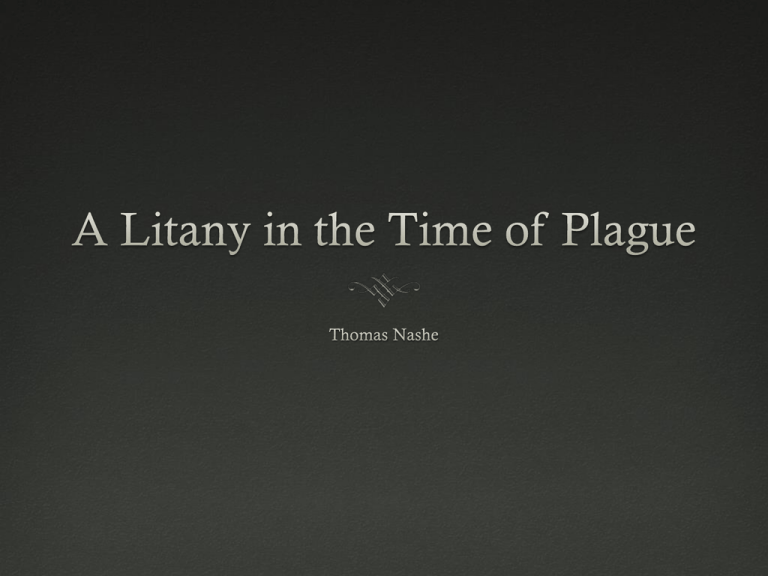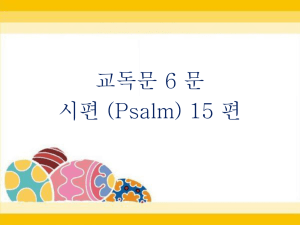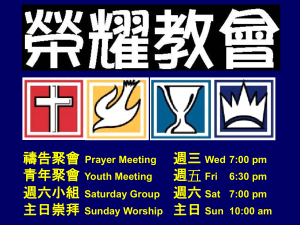
Thomas Nashe
Nashe earned a B.A. at
Cambridge.
His earliest works were literary
criticisms mixed with social
commentary. His first success was
a short book about a writer so tired
of being poor that he accepts the
devil as a patron.
He experimented with different
types of writing from plays to soft
porn. He also wrote pamphlets
attacking anything he saw as
wrong—like Puritanism. He was
once jailed for writing a pamphlet
about London authorities.
Though popular for his pamphlets,
he was always broke because of his
drinking, smoking, and casual sex.
A year before he died at age 33,
authorities banned everything he
ever wrote.
Left is the only known sketch of
the writer; note the leg chains!
1567-1601
A Litany in Time of Plague
Thomas Nashe
Adieu, farewell, earth’s bliss;
This world uncertain is;
Fond are life’s lustful joys;
Death proves them all but toys;
None from his darts can fly;
I am sick, I must die.
Lord, have mercy on us!
Beauty is but a flower
Which wrinkles will devour;
Brightness falls from the air;
Queens have died young and fair;
Dust hath closed Helen’s eye.
I am sick, I must die.
Lord, have mercy on us!
Wit with his wantonness
Tasteth death’s bitterness;
Hell’s executioner
Hath no ears for to hear
What vain art can reply.
I am sick, I must die.
Lord, have mercy on us!
Rich men, trust not in wealth,
Gold cannot buy you health;
Physic himself must fade.
All things to end are made,
The plague full swift goes by;
I am sick, I must die.
Lord, have mercy on us!
Strength stoops unto the grave,
Worms feed on Hector brave;
Swords may not fight with fate,
Earth still holds open her gate.
“Come, come!” the bells do cry.
I am sick, I must die.
Lord, have mercy on us!
Haste, therefore, each degree,
To welcome destiny;
Heaven is our heritage,
Earth but a player’s stage;
Mount we unto the sky.
I am sick, I must die.
Lord, have mercy on us!
Content
This poem was inspired by the
Black Plague that killed one-third
of the population in medieval
Europe and continued to decimate
the population during the
Elizabethan era.
When the plague hit, many people
fled the to avoid a painful death.
http://www.youtube.com/watch?v=rZy6XilXDZQ
Structure
This poem is a “litany,” a prayer
recited by clergy with responses from
the congregation. As such, it reminds
the respondent that death affects
everyone.
Each stanza focuses on an aspect of
life affected by infection.
The rhyme scheme is AABBCCD. The
final break is a reminder that all will
die, and hopefully head to heaven.
Rhythm makes the poem easy to recite.
A refrain appears in each stanza to
emphasize that death is inevitable and
that salvation is, hopefully, next.
Prayer/sermon begins on a negative note by
reminding listeners that death is inevitable.
The caesura demonstrates the stopping or
ending of life.
Death is
personified to
show that
“Death” will
come for all.
Metaphor compares
joys to toys to show
how unsubstantial
life’s pleasures are.
Adieu, farewell, earth’s bliss;
This world uncertain is;
Fond are life’s lustful joys;
Death proves them all but toys;
None from his darts can fly;
I am sick, I must die.
Lord, have mercy on us!
The use of end
stops at every
line creates a
list of
statements that
show how
death
overpowers all
of life’s joys.
Refrain, with ample use of
caesura, emphasizes, first,
that sickness and death
affect everyone and,
second, that the “Lord”
will grant salvation. This
final line is like a plea for
salvation.
Allusion to game of darts
shows the inevitability of
death hitting its target.
Use of second person pronoun makes
this pronouncement personal.
The continued end stops and caesura accentuate the level of mourning in the poem.
Rich men, trust not in wealth,
Gold cannot buy you health;
Physic himself must fade.
All things to end are made,
The plague full swift goes by;
I am sick, I must die.
Lord, have mercy on us!
Reference to gold could reflect
practice of unethical
“physics,” or doctors, selling
fake remedies for profit.
Note repeated reference to all
succumbing to death, even the
“physic.” “Full swift” shows how
quickly death wins.
Metaphor compares “beauty” to
a “flower” to show how physical
assets fail to prevent death.
Alliteration of “w” speeds
up the line to show how
quickly beauty fades.
Beauty is but a flower
Which wrinkles will devour;
Brightness falls from the air;
Queens have died young and fair;
Dust hath closed Helen’s eye.
I am sick, I must die.
Lord, have mercy on us!
Brightness references Queen Elizabeth whose reign
brought prosperity to Great Britain, “Queens have
died” follows as a reminder that no one is safe from
the plague.
The allusion to “Helen” is another reminder about
“beauty” and its inability to stave off death.
Allusion to Ecclesiastes 12:7—”For then the dust will return
to the earth…” This reference reflects hope of salvation.
http://www.youtube.com/watch?v=CiQ4j-D5o4o&index=6&list=UUAiABuhVSMZJMqyv4Ur5XqA
“Strength” is
personified to
reflect its
submission to
death.
Metonymy is used to
reinforce the power (or
lack thereof) of
strength.
“Earth” and “bells” are
personified to reflect
death’s consistency.
Strength stoops unto the grave,
Worms feed on Hector brave;
Swords may not fight with fate,
Earth still holds open her gate.
“Come, come!” the bells do cry.
I am sick, I must die.
Lord, have mercy on us!
Allusion to
Hector, noted for
his nobility and
courage, reinforces
death’s power over
life.
“Bells” reference
the church bells
that ring when
someone dies.
Personification considers with
“Wit” and “Hell’s executioner.”
Again, life lacks control over death.
Wit with his wantonness
Tasteth death’s bitterness;
Hell’s executioner
Hath no ears for to hear
What vain art can reply.
I am sick, I must die.
Lord, have mercy on us!
Use of first person in
first line of refrain
conveys a sense of
hopelessness.
The synecdoche of “ears” reinforces
death’s lack of prejudice.
Tone turns positive in the last stanza as “heaven is our destiny.”
“Earth” is
personified as a
“player,” a
temporary home
until
“we…mount…un
to the sky.”
Haste, therefore, each degree,
To welcome destiny;
Heaven is our heritage,
Earth but a player’s stage;
Mount we unto the sky.
I am sick, I must die.
Lord, have mercy on us!
Reference to “heaven” and
“Lord” denote a Christian
god.
“A
player’s stage”
alludes to several
Shakespearean
plays: “All the
world’s a stage.
and all the men
and women
merely players.”
This reminds
mankind of his
temporary
residence on
Earth.
Tone
The tone of the poem is
negative and unwavering
until the last stanza where
the possibility of salvation in
“Heaven” is addressed. This
ends the poem on a more
positive note.
barriersbooksandassociates.com
Works Cited
http://aspoetryanalysis.weebly.com/index.html
http://literatureencore.net/?p=74
http://sicttasd.tripod.com/









